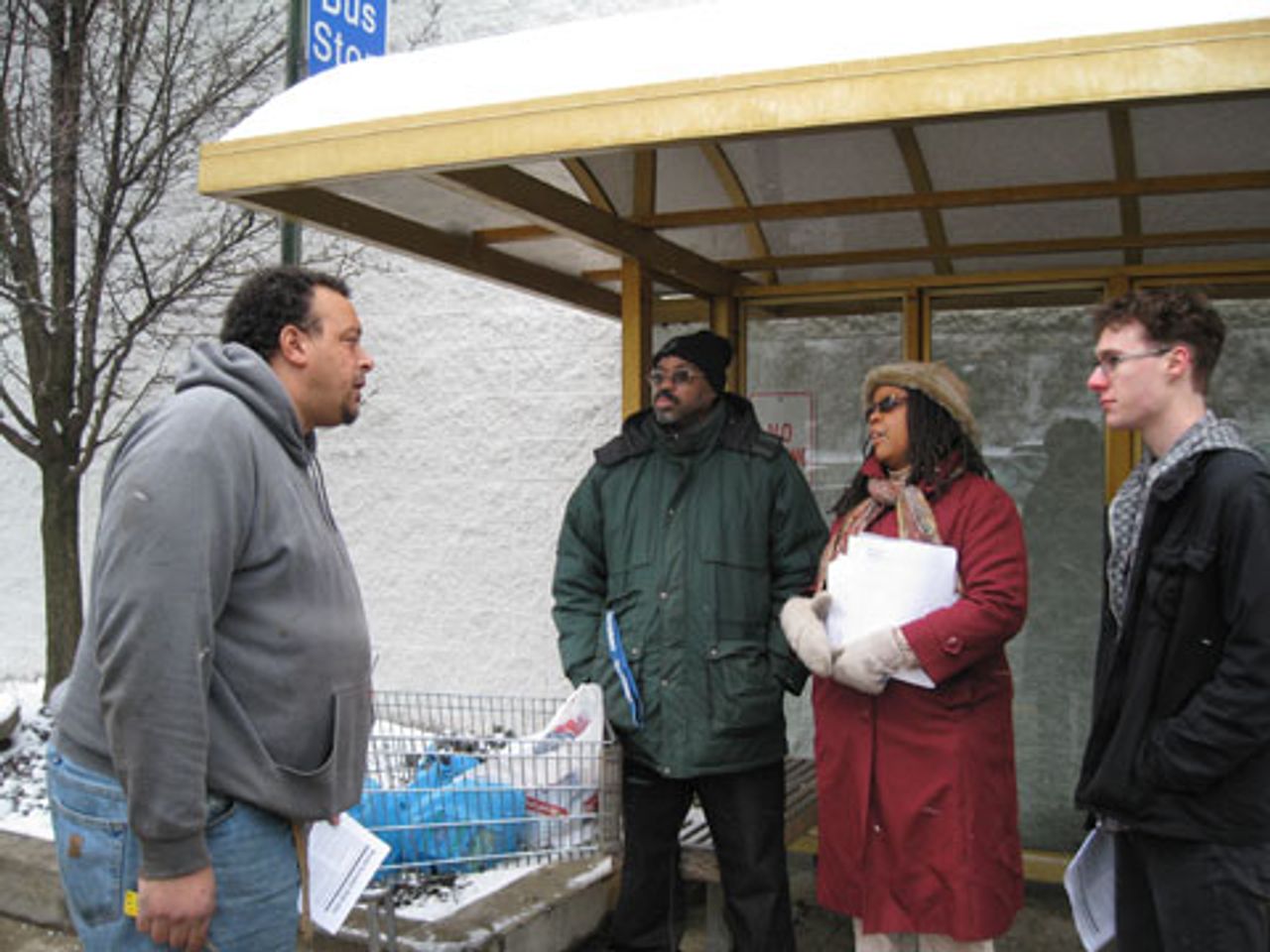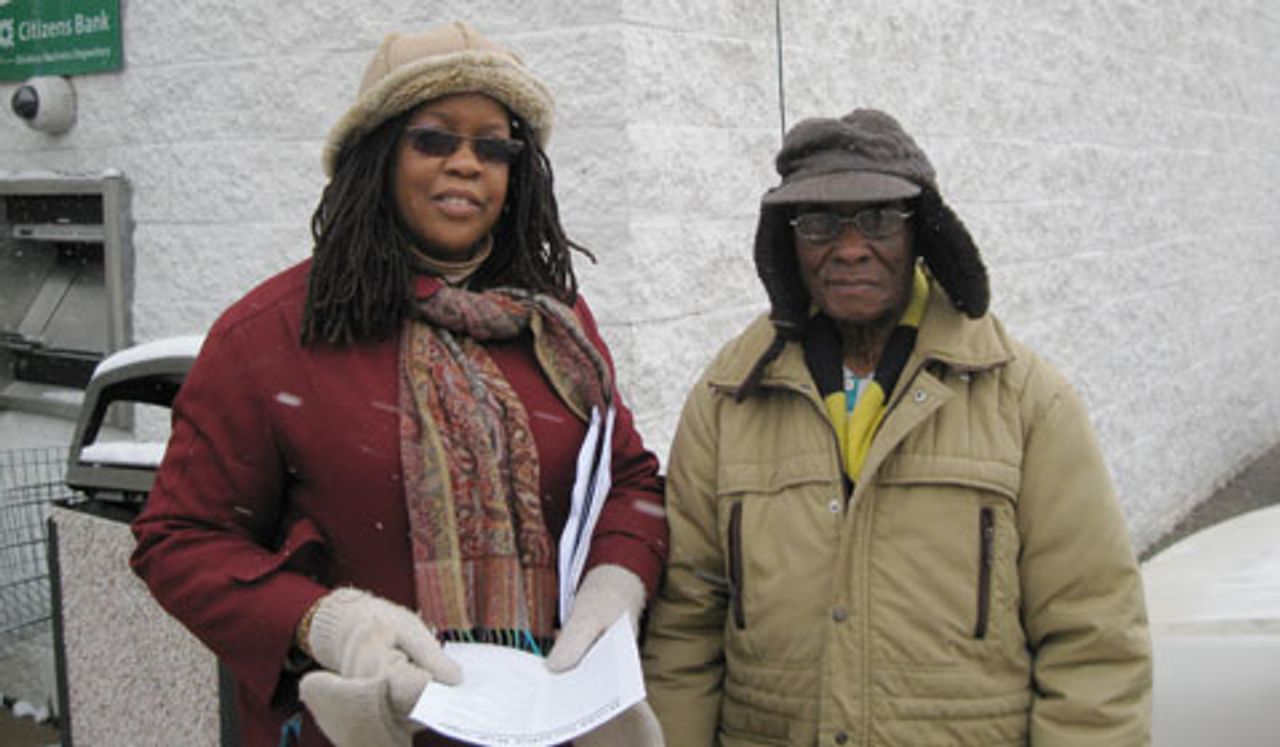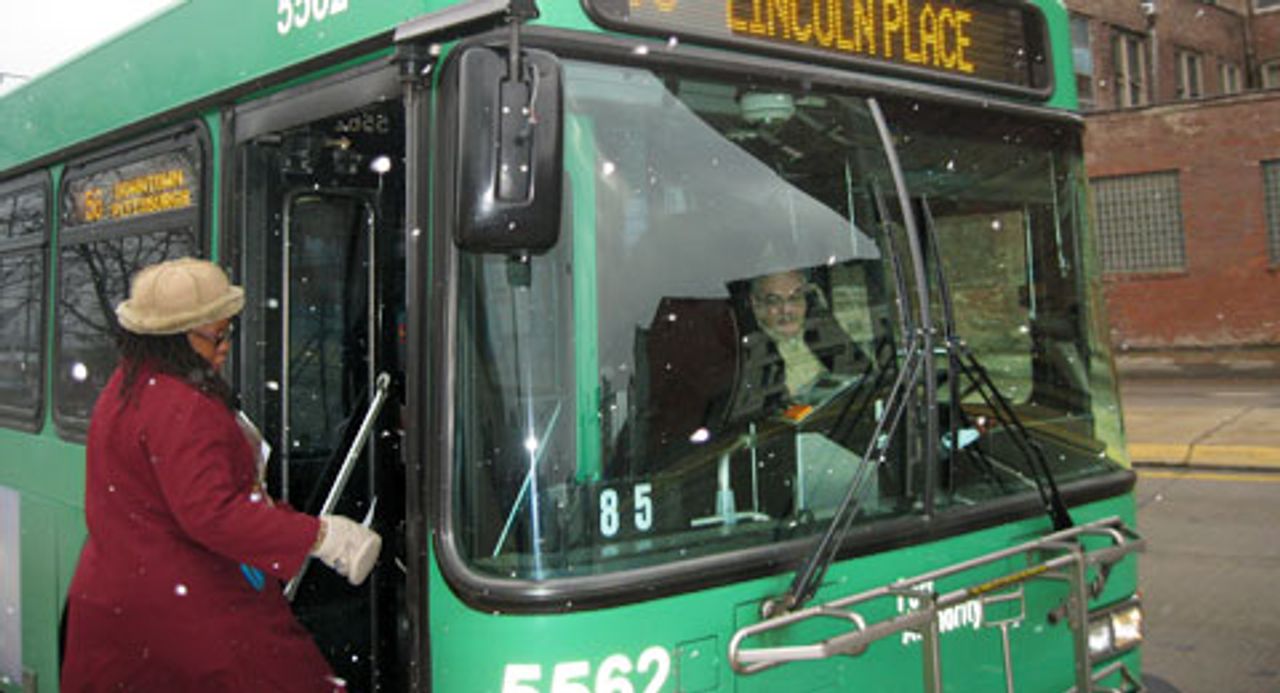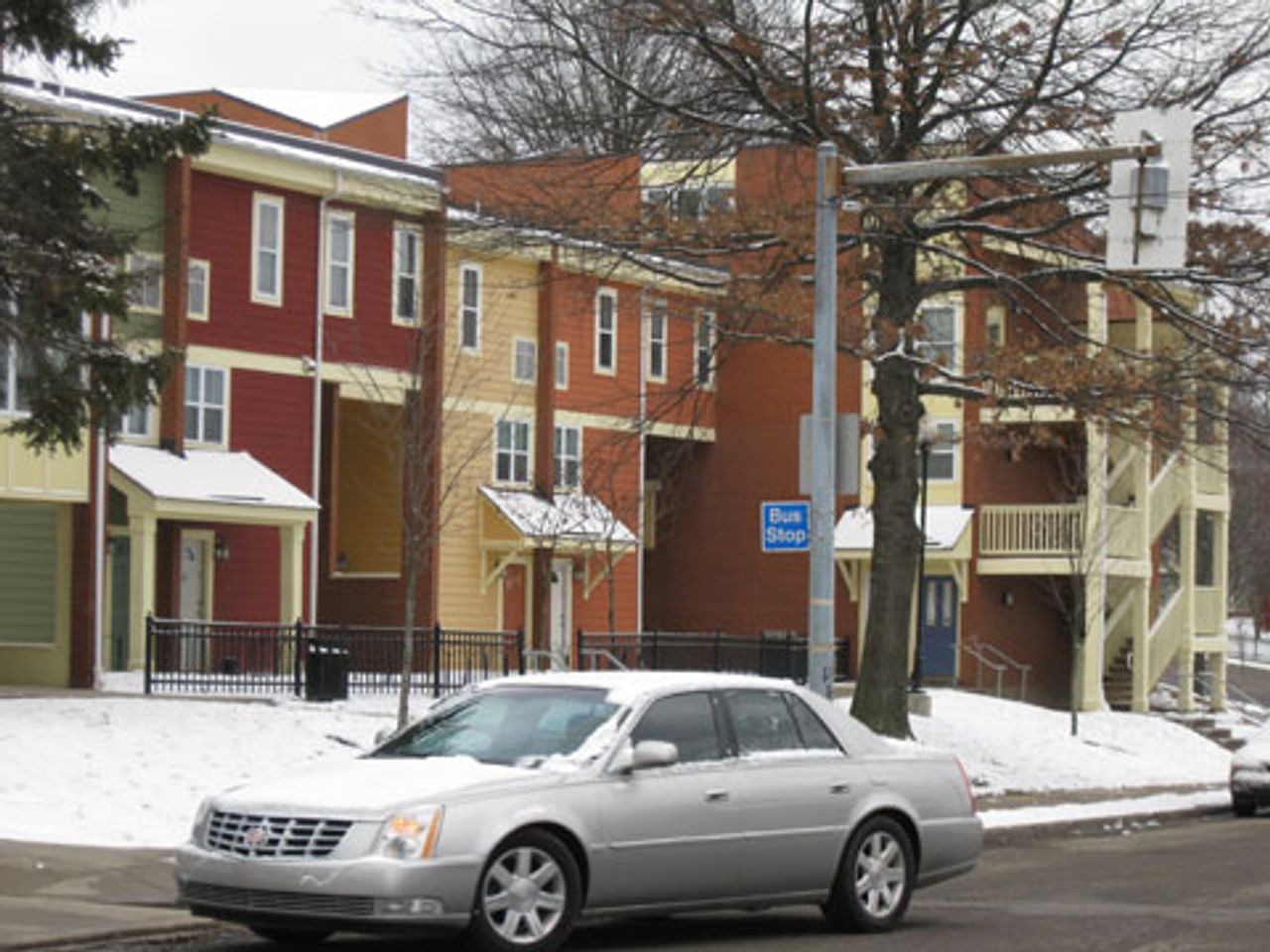Socialist Equality Party candidate for vice-president Phyllis Scherrer won strong support from bus drivers and riders as she campaigned in the Pittsburgh area this past weekend.
 Phyllis Scherrer and ISSE members speaking with workers at a bus stop in the East Hills. Steven Allen on left
Phyllis Scherrer and ISSE members speaking with workers at a bus stop in the East Hills. Steven Allen on leftThe Port Authority of Allegheny County, which operates the bus and light rail system in and around Pittsburgh, has announced plans to cut bus service by 35 percent this fall. Some 45,000 daily riders, in over 100 Pittsburgh neighborhoods and surrounding communities will be affected as 45 of the system’s 102 routes will be eliminated, while service is reduced on those that remain.
“This is going to hurt a lot of people,” said Henry Sowell, who worked as a chef for 30 years and now drives a jitney. He spoke with Scherrer at a bus stop outside a Giant Eagle supermarket in the East Hills neighborhood of Pittsburgh. The 79 East Hills bus is being eliminated under the Port Authority plan.
“People won’t be able to get to work, go shopping, get to the doctor or see their friends.”
Sowell pointed out that it will now cost people $6.00 each way to get a cab to the Wilkinsburg stop of the East Bus Way, which will be the nearest stop after the 79 bus is eliminated. “And they still have to pay their bus fare to get to work. That is $8.50 each way just to get to work. Jobs don’t pay enough for people to afford that. People won’t be able to get off the hill.”
 Phyllis Scherrer speaking with Henry Sowell
Phyllis Scherrer speaking with Henry SowellPittsburgh is located in the southwestern corner of Pennsylvania, at the foothills of the Allegheny Mountains, where the Allegheny and Monongahela Rivers join to form the Ohio. Elevation in the area is 696 feet above sea level at the river base to 1,223 feet above sea level at the highest point. This makes walking up the countless hills in the area difficult at best, and very treacherous in icy winter weather conditions.
Scherrer explained that a reliable public bus service is a necessity for people to live. She explained that the cuts in bus service are part of the attack on social programs such as education, and health care taking place across the country.
“The Obama administration has spent trillions on bailing out the banks and for war, but when it comes to the needs of the working class, they say there is no money,” she said.
Steven Allen, who is unemployed, said that he will help the campaign in any way that he can.
“I am an ironworker and I have been unemployed for two years,” he said. “I lost $30,000 when Wachovia bank went down. I lost my life’s savings. Now I am living in public housing, and I drive a 1990 car. I am tired of all the bull. I think the politicians are just lying to the people.
“I am at the third tier of unemployment, so I am about to be cut off. They are not building anything around here. I should know. I work in the construction industry. I will get called back for a day or two every now and then, but that is it. There is no work.
“The government should not be cutting transit and other programs. People need this in order to live. There are a lot of elderly people up here on fixed income. What do they expect them to do? I think it is time that someone stands up for the working man, I am glad to see that this is what you are doing.”
 Phyllis Scherrer speaking with a bus driver outside the McKeesport bus depot
Phyllis Scherrer speaking with a bus driver outside the McKeesport bus depotDuring the time that Scherrer was campaigning, buses came and went and the SEP candidate spoke with the drivers. They told her that they are not allowed to stop and speak to her while in uniform and working, but they all thanked her for being there and fighting against the cuts.
Tauoyn Ray Naylor, a nurse for 22 years who works at the Commons in Squirrel Hill, a nursing and rehabilitation home, took the campaign flyer that Scherrer was handing out and said that she would make copies and give it out at work. She explained that there was a meeting at the nursing home on Monday to discuss the cuts in bus service.
“There are a lot of people who won’t be able to work,” she said. “We already aren’t on the bus line. We have to walk three long blocks from the closest bus stop.
“I know there are a lot of people who aren’t going to be able to work and then we can’t give care to our patients. We have 276 people at work, so probably 100 won’t be able to make it. There are at least 100 I know that.”
Next, Scherrer went to the bus depot in McKeesport, just south of Pittsburgh. There, riders transfer to and from Pittsburgh buses to those that serve McKeesport neighborhoods and other communities along the Monongahela River.
Many of the connecting buses will be eliminated or have their service cut back. Over 100 Pittsburgh neighborhoods and surrounding communities will be completely cut off bus service. The Port Authority says that the cuts are necessary because there are not enough riders on these buses to pay for them.
Scherrer told bus riders that the SEP fights for public transportation as a right that it is especially needed in all working class and low-income areas so that people are not cut off from work, shopping, health care and friends. The most vulnerable, such as the elderly, the poor, and disabled, need it the most.
Ron Black, a customer service representative at a major bank, who was out shopping with his family said, “I don’t like the cuts. This is going to hurt a lot of people as far as jobs, and it’s actually going to hurt the employers as well. They are going to lose many people who can’t get to work. Many people who work and depend on public transportation will be out of a job. So I think it’s a lose lose situation all around.”
Referring to the building of a $600 million tunnel under the river to provide train service to the two new stadiums and casino, he said, “I think it’s so wrong when you have a connector down to the North Side. In all honesty, do we really need that when we have buses that already go over there. The streets are already available, you just have to maintain them, and you don’t have to dig under the river. It’s crazy what they could do with that money and actually put it into transit.”
 Homes in the East Hill neighborhood where residents will be without bus service
Homes in the East Hill neighborhood where residents will be without bus serviceScherrer explained that the priority of both the Democrats and the Republicans, both locally and nationally, was the profits of the wealthy and the corporations. Obama administration spent trillions on bailing out the banks and the wars in Iraq, Afghanistan, and Libya, but when it comes to programs to the working class, it says there is no money. Similarly, local Pittsburgh politicians squander more than a half a billion dollars to make recreation more accessible to those with money, not the working class.
Nathaniel Brock, a young worker who got off the 61C from Pittsburgh, explained that the 7P, the express bus to Pittsburgh, is going to be cut. “This is going to mean that it will take much longer for people to get to Pittsburgh,” he said. “The 61C (which provides local service to Pittsburgh) is already overcrowded. A lot of times it won’t pick up people going through Oakland, which is where all the college students and people who work in the hospitals work.
“There are many people who can’t afford a car, and they work night and weekend shifts. If they can’t get a bus they will lose their jobs. The politicians don’t care about these people because they are not rich.”
